Introduction to the series, for new readers:
As someone who’s the same age as “the internet,” I’ve become part of the generation that utilizes it in every area of our life. So, quite naturally as someone who grew up with video games, I’ve been browsing gaming discussion boards for years. With the growth in popularity of video games, an occurring topic over the last few years deals with improving yourself as a player. However, additionally to “How to get good?“ threads, I regularly see threads asking generic questions regarding player mentality.
As a response to those regularly emerging questions, I’ve decided to start a series of short articles called “Ranking-Up your Mentality,” covering how to deal with the issues of tilt, anxiety, motivation and confidence. Often, the questions I see are in regards to other aspects of your mental game, such as focus, discipline, decision making, and playing “in the zone.” However, by addressing the aforementioned four, you will naturally improve in the other areas while the reverse is not true.
There is also a relationship between different issues that could be important to examine. For example, motivational problems may occur due to tilt, tilt can be caused by lack of or too much confidence and confidence issues can arise as a result of anxiety and etc. As a result of that, keep in mind some entries can appear unnecessary for you to read at first glance, but they actually are relevant to issues you want to address or don’t even know you had. In a way, those four are the founding pillars of players’ mindsets and that’s why they are at the core of the topics I plan on addressing.
As I plan on making semi-regular entries, I’ll be trying to cover one issue at a time. Sometimes though, if I feel the topic requires addressing more issues, some might feel overwhelmed. If you find yourself in such a position, just take it one at a time and prioritize in a manner of your preference. Look at it as if it’s a new game you are learning: at the start, there might be too many things to worry about. But when you start learning the different mechanics one at a time, soon you’ll be able to see how everything fits together.
The process of improvement in mentality is slow and steady rather than happening overnight. Simply because you’ve read about an issue and understand it does not mean you’ll be solving a problem overnight. Be ready to continuously work on your mindset as you do for becoming better in everything else. If you have questions, you can always search for more extensive sources or ask me in the comments below or on Twitter.
Keep in mind people are different and it’s hard to know what is going to work best for each individual. Start by following basic concepts and strategies for solving your issues and later after acquiring some knowledge and experience, you’ll be able to figure out what works best for you. Again, this is no different from learning a new game; at the start, you’ll be learning basic mechanics and concepts and later on you can use whatever fits your playstyle best.
As some readers might be curious, the information I am providing in this series is going to be based on personal research and many improvement, psychology and mindset books and articles I’ve read previously due to my own interest in the topic. If you wish to learn more about me, you can find information at the bottom of the article.
My intention for the series is to cover the basic mentality issues I often see with players and provide novice toolkits of strategies and some specific tactics for dealing with them. So don’t take everything written here for gospel, instead try to understand how and why the described processes and techniques work. Once you do that, you’ll be able to continuously adapt them to fit you best.
Additionally, the concepts and strategies for dealing with issues introduced in the series are not exclusive to specific games or gaming. Once you understand why and how they work and benefit your mentality in gaming, you will be able to apply them to other aspects of your daily life outside of gaming. Often people can find that they have a specific mindset issue in general, rather than just in a specific area of their life.
And finally if you’ve stumbled randomly upon this, don’t be anxious to go ahead and read about the specific topic, without reading previous entries. I’m writing the series in mind with people who haven’t read the previous entries and if knowledge of something I’ve talked about previously is required I’ll be making sure to link or quote.
One of the first and most important things that happens in serious sports or learning facilities is a structuring of the learning process. The purpose of doing that is so you can organize the things you are doing to make the most out of your time and give you a better opportunity to perform at your best. While most professional players already do it to some degree, many others looking for improvement in their gameplay, remain oblivious to the idea. Often times, it stems from the fact that games are meant for relaxation and fun. As a result, even competitive individuals that want to get better, tend to think of them as entertainment, rather than competition. And while getting better by playing is definitely fun, it isn’t as time-efficient and quick as doing so by practice.
The process of structuring begins with creating a regular practice schedule for yourself. Practicing regularly helps the build-up of muscle memory and doesn’t let you forget what you did the previous session.
Obviously, not everyone can dedicate enough time to playing every day. When it comes to playing actual games, it vastly depends on the title and the amount of time you can dedicate to playing at a time. The length of an actual match can be as low as 10–15 minutes for some games, while for others it can go over hour. If you are a busy person and your game of choice doesn’t allow you to play actual games every day, it’s still better to practice on a daily basis rather than dedicating longer amounts of time once or twice a week.
For example, if you get snippets of 10–20 minutes of free time during the day, that’s a perfect time during which you can analyse, research and prepare information for your practice sessions. If you get an hour break, it’s the perfect opportunity to put in some practice. This way, when you come down to your regular play session, you’ll have more time for playing games.
The process itself comes down to three simple aspects: preparation, performance and analysis. The three of them are intertwined; you analyse your performance and adjust your preparation, based on your analysis. Then your performance depends on your practice and preparation, and the circle goes on.
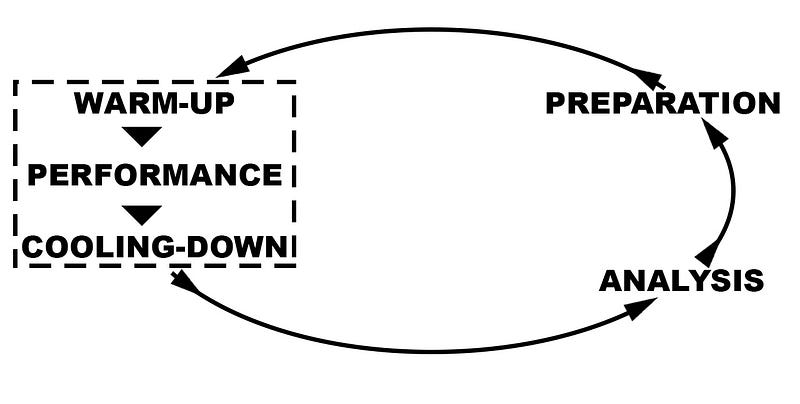
An additional benefit from structuring the process is that you’ll have a guideline for how you are doing other than the results. You’ll have the evidence of your analysis and practice that you are indeed improving, even when you have poor results. This, in turn, will strengthen your mental fortitude and make you less susceptible to performance anxiety, confidence issues and tilt.
In the rest of the article, I’ll take a more detailed look at each of these elements.
Preparation and Practice
This is the time when you take all the information and notes on your game and work on the aspects you’ve found lacking. It is also the proper time for researching new strategies and introducing new elements to your game. Research can be done in many different ways, from reading articles and watching videos to doing calculations and all kinds of in-game research yourself.
It is also when you practice the mechanical aspects of the game and learn new techniques. As noted in the previous entry, mastering a technique in practice does not instantly translate into being able to perform it in the game right away. This is much more time-efficient than doing so in a real game, as you can perform it many more times during practice. An important note to take here is that you should practice with proper technique and dedicating your full attention to the practice. I’ve noticed many people who slack off during their practices, while listening to podcasts, music or getting distracted otherwise. As a result of the lacking attention, they practice with poor technique and later make mistakes in a game. Ultimately, the way you play in practice is the way you’re preparing to perform.
As for methods of practice, it varies from one title to the next. It can be done through community maps, different game modes, practicing specific things in empty servers, sandbox mode or versus AI and etc. If you are not sure how to practice in your game of choice, you can ask on discussion forums. If you still can’t get an answer there, feel free to ask in the comments or hit me up on Twitter for ideas.
Warming up
The purpose of this is so you can play at your best right from the get-go. Skipping it can result in your performance being lackluster at the start of the game and more importantly your focus not being quite there yet. In turn, this makes you prone to silly missteps, which opens the doors for tilt and other mental game problems. Warmups should take about 10–20 minutes and while ideal amounts vary from person to person, you shouldn’t go much beyond that. For myself, I’ve broken this into four more small steps:
1. Getting in a game mindset and removing all distractions. That includes everything not related to your gameplay: other games, browsers, television, your phone, pending conversations — be it online or offline and etc. If you are someone that plays with music, I’d advice turning it down and listening to something without text, that won’t take away from your focus on the game.
Additionally, you can also try physical exercises, meditating or breathing exercises to get focused before games. Keeping notes and to-do lists is also a good way to stop things you have to address from constantly weighing on your mind.
2. Decide how long you’re going to play. Having a predetermined amount of time makes the process more structured and will improve the mental endurance for many. Of course, the amount can be adjusted based on your performance, but you shouldn’t cut it too short because poor performances, or go too long if you’re playing well.
3. Review your goals and preparation. This includes long-term goals and specific things you’ve been working on recently, be it mechanical or mental aspects. This also includes strategies for dealing with emotion related problems, like raging, anxiety and etc. It is important to remember that this is not the time to learn; it’s the time to reinforce what you are learning, so it is more likely to materialize during your performance.
4. Mechanical warmup. Last but not least, just like in traditional sports, you warm up before a game, so you do the same here. Additionally, to warm up in-game, I recommend doing hand exercises and stretches. This will make sure you don’t experience any physical injuries as a result of playing. For specific exercises, I recommend watching Dr. Levi Harrison’s videos dedicated to gamers.
Performing
Both in traditional sports and video games, real matches are the only way for players to test themselves. With the latter, however, it’s considerably easier to find a game with players who are around your level to put your practice to the test.
One of the most important things for performing to the best of your abilities is to stay focused on the game. The nature of many games introduces downtimes. Utilize those to plan what you are going to do going forwards and reminding yourself about the goals and preparation for the session.
A distraction, that a lot of players fall for, is trying to analyse or evaluate your performance during game-time. It can start with the good intention of correcting a mistake, but ends up with questioning all of your play and splitting your attention between current gameplay and thinking about what already happened. Not focusing on the game fully leads to more mistakes. That, in turn, opens the door for tilt and other mental game problems and leads to more poor performances.
This is why both evaluation and analysis are best left for after the game or after your play session. A good solution for stopping yourself from mid-game reviews is writing down the time of the moment you want to look at on the replay or demo. When you’re actually playing, you’ll play your best by focusing on the game itself and not on how you are playing.
Cooling Down
Spending a short time evaluating your performance is good way to put down the game when you’re done playing and reset your mind before the next time you play. A good way for doing this is a fast review of the replay or demo and taking some notes.
I’ll list some specific methods you can use. If you are not used to doing this, you can start with the first two and when you feel comfortable, continue adding the rest one by one.
1. Estimate how much variance influenced results. It’s important to be honest with yourself here. How much was it actually your team playing poorly or the opponent getting lucky with something? How much luck did you get on your side? The purpose of this is to understand that bad results don’t necessary mean lack of progress, and vice versa, good results don’t mean you did everything well.
2. Evaluating your performance separately from the result. Try to estimate how you did in the areas of your game you are trying to improve, be it game or mindset. Did you see any progress? Were there any mechanical mistakes in your gameplay? Are there flaws in your decision-making process? If yes, is it something that you’ve worked on already, or is it a new one? Did you let your emotional attachment to you or teammates’ performances get the best of you and make illogical decisions or mistakes? The answers to these questions should help you figure out if you need to work on what you’ve been practicing so far, be it mechanical or mental issues, or move to a new area of your game.
3. How much impact did you have on the result? While playing well is important, you can play well, without making mistakes and still lose, because of how you played. While in most cases, waiting for the enemies to make a mistake is a smart strategy, sometimes you need to be the one initiating plays.
4. Reviewing specifically marked down moments of the game. Good moments to review are not only the ones where mistakes happen, but also interesting plays you or your opponents make. Another good idea is to write down the time of when you got emotionally distressed and review those as well. Did you really get annoyed because a teammate made a stupid mistake? Was it actually a reaction to you playing below expectations? That doesn’t mean you need to go into a hardcore analysis, but at the minimum, take some game notes, so you can analyse within the context when working on them later. Take a note of new things you did well too. This can highlight specific directions to further improve your gameplay in future.
5. Take notes regarding anything new you’ve discovered during your session. The opportunity can be used to vent by writing about whatever is troubling you, be it game-related or mindset. Try to estimate whether you accomplished the goals you set before the session. If you fell short, what is the reason?
Analysis is the time when you are actively working towards improving without actually playing. It is generally composed of watching VODs, asking and answering questions regarding what’s going on and evaluating different aspects of your gameplay separately from each other and from the result. When looking at your own play, you can focus on several aspects of the gameplay, rather than looking at everything at once. While you can still take notes on different elements of your play, the focus should remain on what you are currently looking to improve. Keeping general notes will help guide the direction of future improvements, but they should be kept general until you decide to focus working on a specific issue.
During the process, you look at anything. Decision making, mechanical execution, mindset and whatever elements you’ve been working on or are looking at improving. It is important, however, to remember that they are all intertwined together. Emotional distress will affect your decision making. The decision making in turn is highly dependent on your abilities for executing what you want to do. For example, someone else might make a proper decision within a game, dependent on executing certain action. However, if you can’t reliably execute the same action that is the wrong decision for you.
Analysis would also be the best time to realistically evaluate different aspects of your play. The heat of the moment is when you’ll show what skills are already mastered and what needs more work on. As the famous navy seal saying goes, “Under pressure, you don’t rise to the occasion, you sink to the level of your training. That’s why we train so hard.”
In terms, monotonous and dull work that’s part of a player’s improvement doesn’t get much worse (or better, depending on your preferences) than analysis. When it comes to benefits though, it’s up there with practicing specific aspects of your game. If you have a limited amount of time, you can only analyse part of your games or specific ones. If so, just make sure you are picking even amounts of good, bad and average games. In case you don’t feel confident in analyzing your own games, you can post them on discussion forums and ask for advice from other people.
After you’re done with analyzing, you’ll have a pretty clear idea which elements of your gameplay need to be refined further and adjust your practice time accordingly. The last note for analysis is to take a break between it and the cooling down period. This way, when doing it, you’ll ignore all emotional attachments that might have happened during the game.
“Every day you miss playing or practicing is one day longer it takes to be good.” — Ben Hogan, one of the greatest golfers of all time.
Ultimately, the regular and structured process of learning makes your approach to performance and improvement more active, organized, measurable and efficient. Often, players will only start actively working on their game when they’re having a bad run, playing poorly, their win rate drops or the end of the season is coming. Instead of waiting until crunch time, it’s much better to practice regularly. Applying proper structure to your practice, and doing it every day, will automatically set you on the way of steady improvement and better results.
Additionally, being focused on the quality of your play rather than the results will minimize the chances of your emotions getting the better of you during a particularly painful loss or run of bad form. The advice that I see often on discussion forums is to “just” ignore bad losses. However, that is much easier when you have something else to focus on.
The previous entry of the series: Ranking-Up your Mentality: Learning about learning
The next entry of the series: Ranking-Up your Mentality: Managing your Emotions (not yet released)
About the author: Hello readers! I go by the ID RadoN and probably similarly to many of you, I’ve been playing video games for years. My introduction to esports happened in 2009 and ever since, I’ve been following different titles within the industry. Games I currently follow are Overwatch, CS:GO, LoL, QL with the occasional SFV and DOTA2. If you wish to provide feedback, support and follow future content, or simply know more about my thoughts on gaming and esports, follow me at @RadoNonfire on twitter.
Photo credits: kemecer, pcpuzzles, thesocialmediaaffair.


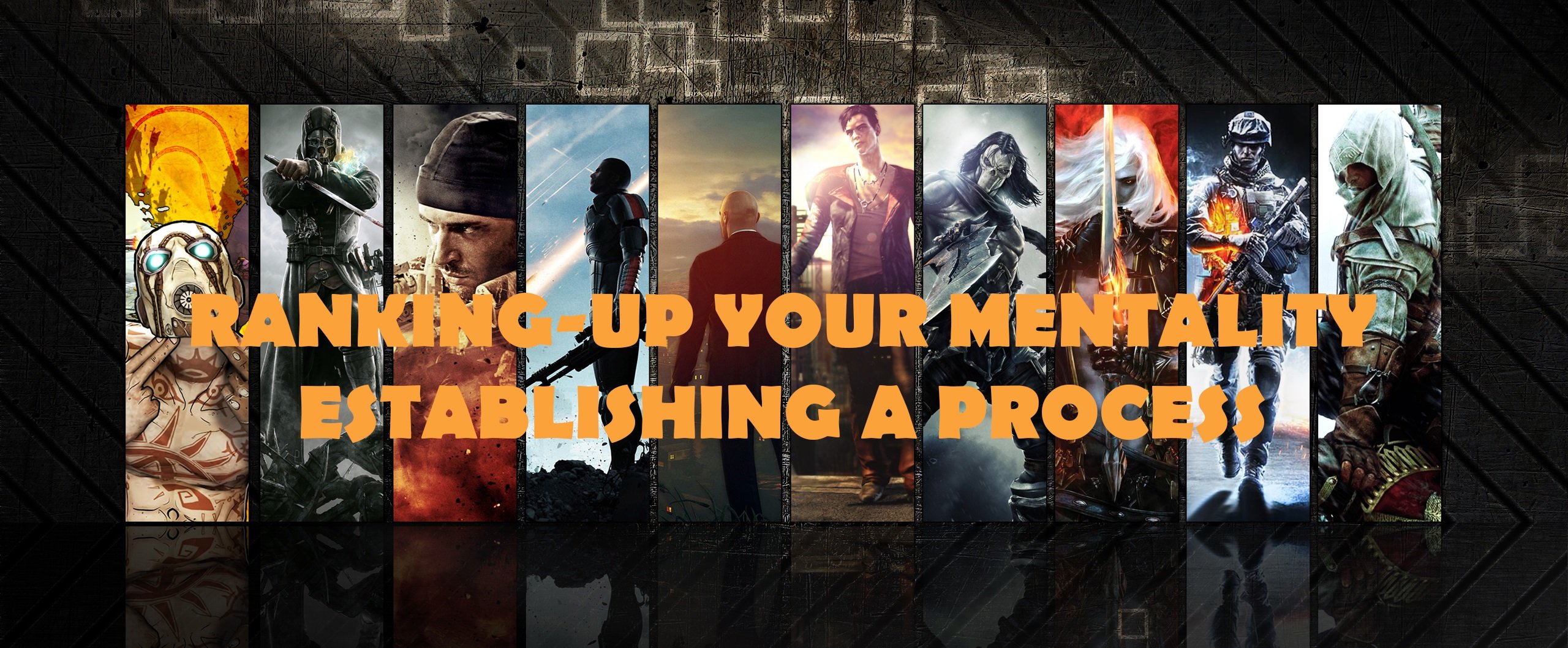
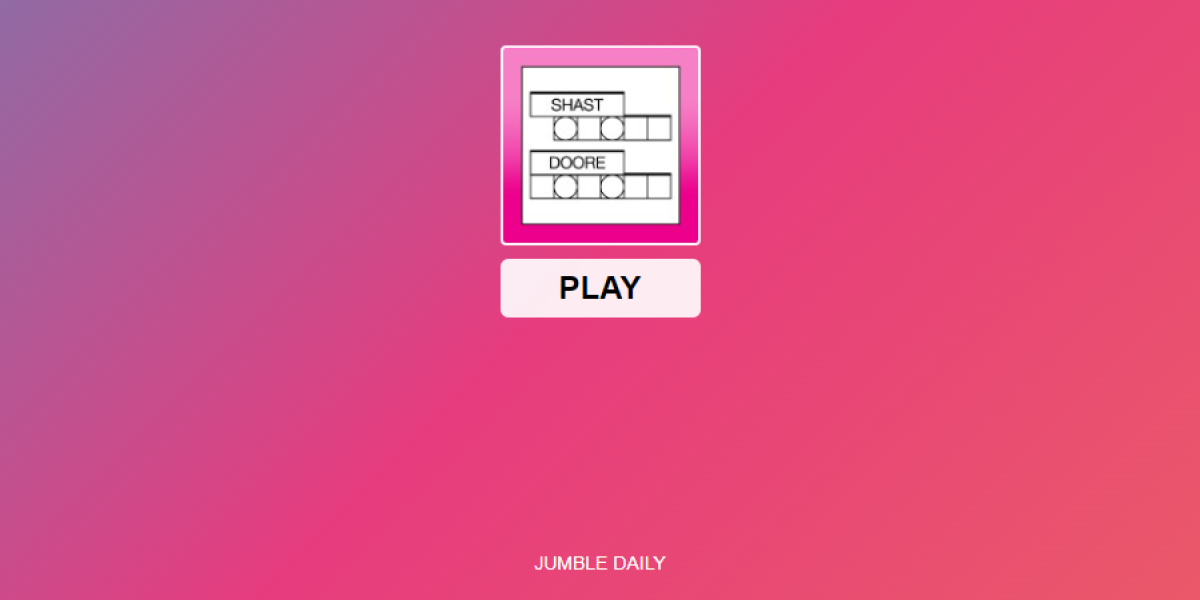
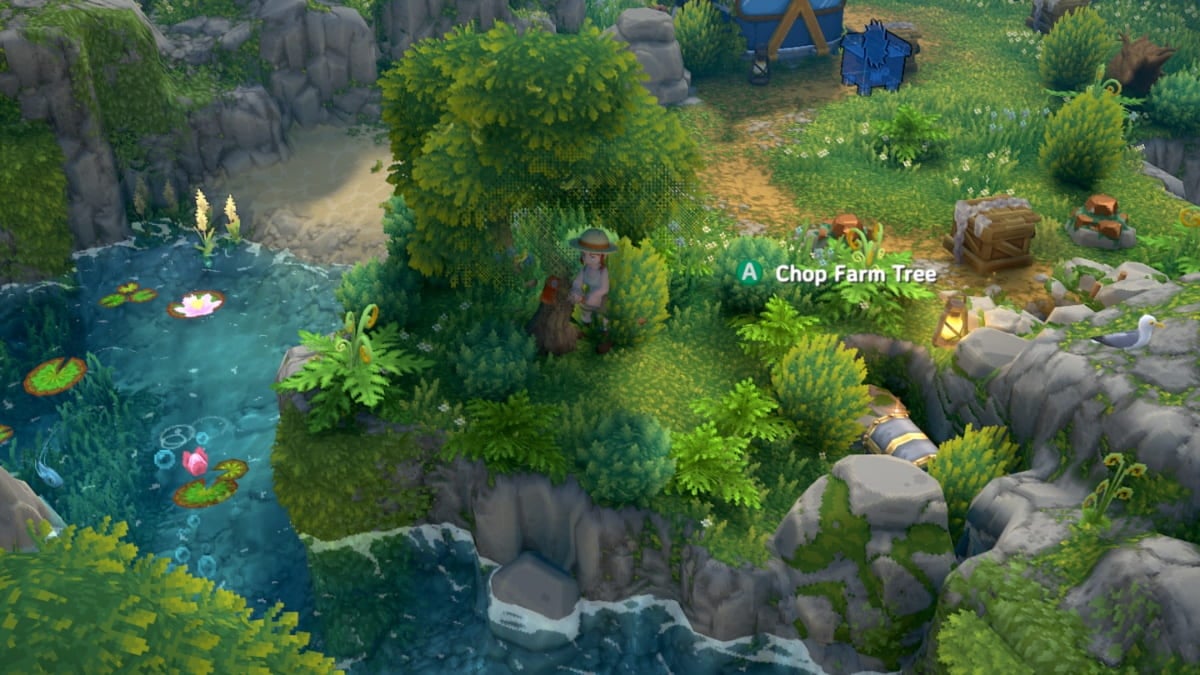
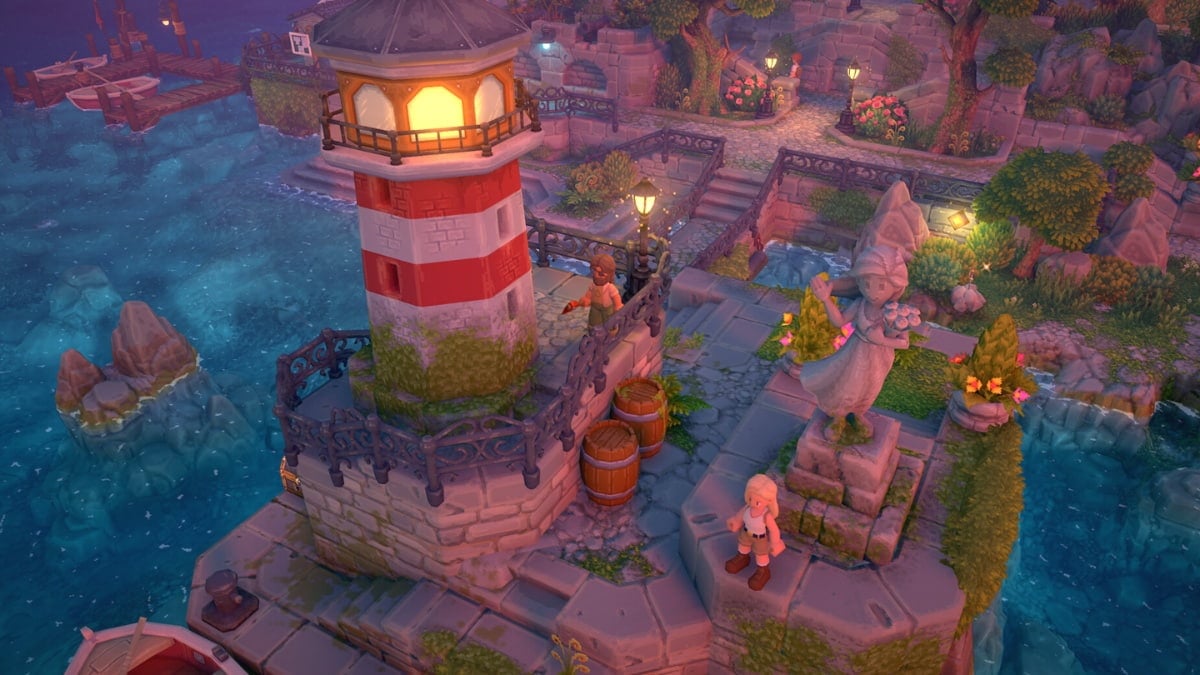
Published: Oct 6, 2016 06:03 pm